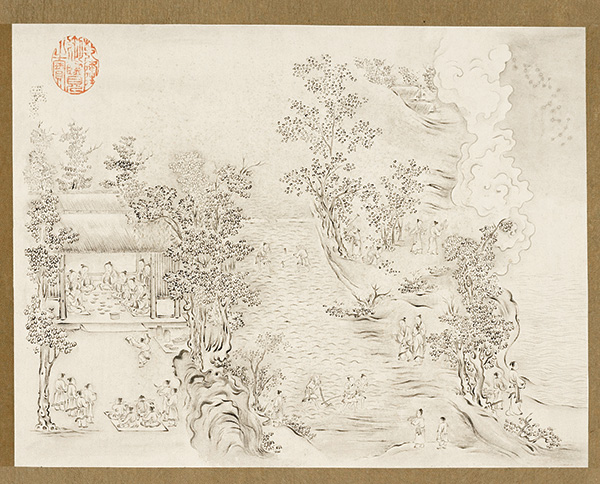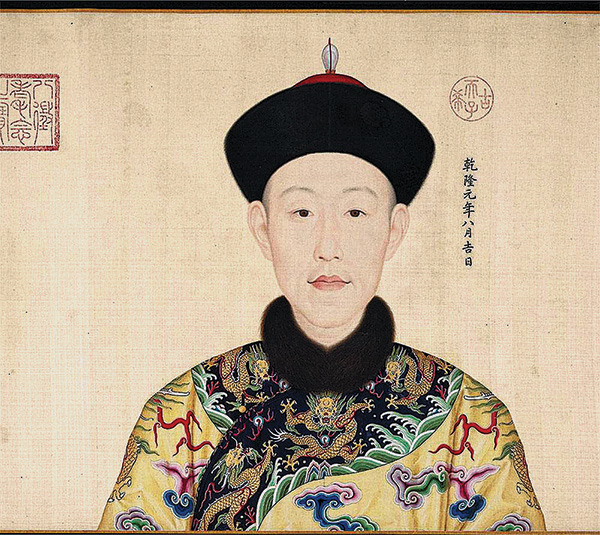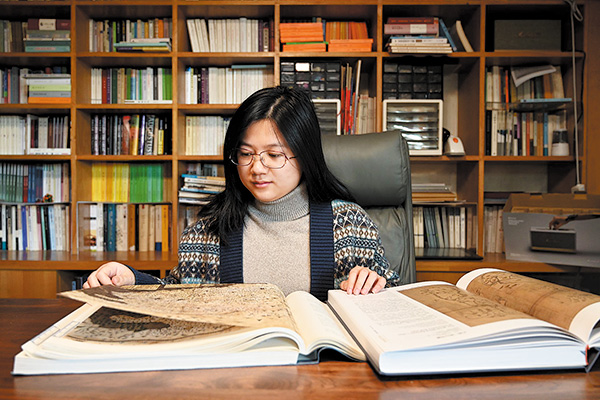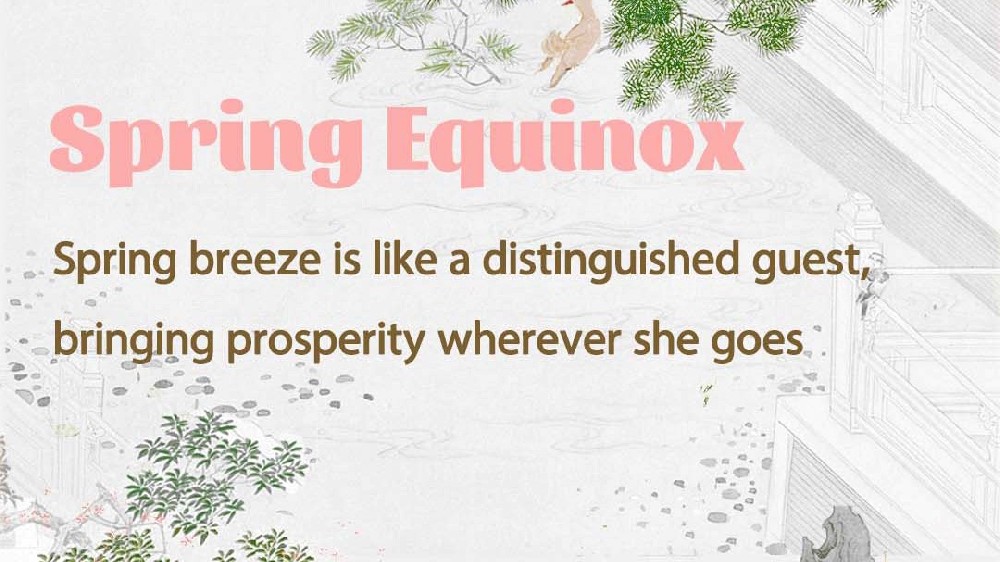A poem of Qianlong's choosing

A painting commissioned by Emperor Qianlong, based on Southern Song Dynasty (1127-1279) painter Ma Hezhi's previous interpretation of the poem July (picture digitally enhanced for clarity). It starts with two stargazers in the far right corner, continues with some farming scene, before ending with a gentlemen's gathering under a thatched roof. The painting is part of the collection of the Palace Museum in Taipei.[Photo provided to China Daily]
'A handscroll with me it has always been; a painting on the poem July, from the Odes of Bin," wrote Emperor Qianlong (1711-99) of the Qing Dynasty, possibly later in his long life, as he lamented in the same poem the changing of the seasons and the passage of time, of which he was reminded by "the sun's fast-traveling shadow across my latticed window".
It seems that this handscroll, which he almost certainly had gazed upon numerous times, had been a rare constant for a man who lived a volatile political life — something he clung to emotionally while doing his balancing act at the pinnacle of power.
In fact, there was not just one, but many scrolls in the emperor's possession that amounted to pictorial renditions of that same poem from the Odes of Bin — a collection of folk poem-songs, which, in turn, forms part of the Book of Odes (Songs). The 305 pieces which make up the book, dated to the 400 years between the 11th to sixth century BC, are believed to have been collected from all over the country during the Zhou Dynasty (c.11th century-256 BC).
From when the Book of Songs became known as Shi Jing (Classic of Poetry), somewhere between the fourth and third century BC, until the fall of the Qing Dynasty in 1911, it was avidly studied by generations of aspiring individuals eager to enter court service, and by rulers who genuinely cared about their subjects, or were eager to be seen as doing so.
Here comes the final piece of the jigsaw puzzle for anyone wondering why Emperor Qianlong, out of all the gems in his enviable art collection, had chosen to be associated with this particular handscroll. When the poem July, which opens with the sentence "In the seventh moon the Fire Star west goes", from which it took its title, appeared in its English version, Chinese translator Xu Yuanchong (1921-2021) titled it Life of Peasants. (The Fire Star is Antares, one of the brightest stars in the Scorpius constellation. In the West it's also called "Rival of Mars" due to its distinct reddish hue.)
For all who have gone through the poem's eight stanzas, Xu's English title is a fair summary of its content, centered on the yearly cycle of a perennially-hectic, if not backbreaking, farming life which, apart from sowing and plowing, also included picking mulberry leaves (for the silkworms), wine-making (for the elders and ancestors), hunting and skinning foxes to make fur (for the noblemen and women), and abode maintenance (so they could survive the coming winter, at the first hint of which, they would say the "Fire Star west goes").

A portrait of Emperor Qianlong (1711-99).[Photo provided to China Daily]
Sense of pride
In pre-modern China, peasants constituted the overwhelming majority of the emperor's subjects. And agriculture, their livelihood, was the bedrock upon which the country stood. That's when the Qianlong poem stopped being a personal contemplation and started to be a thinly-veiled political statement — a portrait of a man whose thoughts had never wandered too far away from those most needing his attention.
However, if one listens to Wu Han from the National Library of China, Qianlong's enthusiasm for the poem-themed paintings may also be tied to a sense of pride that he was able to draw from marked parallels between the history of the founders of the Zhou Dynasty and that of his own.
"In the twelfth moon we hew out ice; in the first moon we store it deep," the poem's last stanza begins. Sixty-seven years before Qianlong was born, the triumphant Qing soldiers rode into Beijing, leaving behind their ancestral home in today's northeastern China, where fishing during long, harsh winters was only possible after one hewed out the ice on the frozen river.
Four times throughout his 60-year reign, the emperor visited Shengjing (modern-day Shenyang city in northeastern China), the one-time Qing capital before its rulers claimed themselves the emperors of China from Beijing's Forbidden City.
"The Odes of Bin, as its title clearly indicates, are folk poem-songs collected from the Bin area. Covering part of today's Shaanxi province, it was the ancestral home for the tribal Zhou people, who spread out from there to eventually overwhelm the once-invincible armies of the Shang Dynasty (c.16th century-11th century BC)," says Wu.
"For someone so conscious of his own legacy, the comparison was obvious. The poem reminded the emperor of the remarkable journey of his ancestors, one that he intended to honor by fulfilling the role of a diligent and benevolent ruler."
In fact, the concept of the right to rule based on the benignity of the rulers was first spelled out during the Zhou Dynasty, founded as much on moral grounds as on the debris of war. This ideological position explained why the Zhou Dynasty was much emulated, even by its distant successors, and why the rulers of Zhou had designated officials whose role was to collect and document folk ballads from around the empire.
Deemed to be the best gauge of the true sentiments of commoners and their living conditions, the ballads used to be sung by those who were most likely to be illiterate — thus the Book of Songs. While the music was no longer extant, the lyrics, thanks in part to royal efforts, survived and caught the attention of Confucius (551-479 BC), who agonized over what he saw as a plain disregard for ethics by his contemporaries and sought to remedy that, partly through championing the study of noble texts.
Although modern scholars remain divided over whether Confucius whittled an original collection of over 3,000 pieces down to the 305 we now know, it's commonly agreed that the philosopher, who once told his only son that "if you don't read the Book of Songs, then you really have nothing (meaningful) to say", was personally involved in the collection's editing and promulgation. (It's worth noting that the poetic value of the existing works of Shi Jing, which enabled them to be called poem-songs, and the stylistic consistency among them, had led renowned German American Sinologist Hans Frankel to believe that the works had "passed through the hands of men of letters".)

Wu Han, researcher from the National Library of China.[Photo provided to China Daily]
Different renditions
The collection received its canonization and came to be known as Shi Jing at the enshrinement of Confucius and his thoughts in the ensuing era. For two millennia, it has been an unquestionable classic and a foundational text, which not only informed and inspired, but also validated every aspect of ancient Chinese society, from family life and education to politics and statecraft.
"Ascending the throne nearly a century after the demise of the Ming Dynasty (1368-1644), the emperors of which were members of China's majority Han ethnic group, Qianlong the young Manchu emperor still felt the need to proclaim his legitimacy, by associating himself with works that marry China's age-old painting tradition to which he was utterly devoted, with the teachings of Confucianism," says Wu.
She was alluding to Qianlong's reassembling of largely-dispersed works by Ma Hezhi from the Southern Song Dynasty (1127-1279). A court painter, Ma spent a sizable part of his career bent over Shi Jing-related works under the royal edict of Emperor Gaozong, under whose reign a weakened Song Dynasty moved its capital from North China to today's Hangzhou city in the south. This was a teetering empire that had lost large chunks of land to, and had two emperors held captive by, the rival Jin Dynasty (1115-1234), the founders of which were genealogically linked to Qianlong's ancestors.
The fact that Shi Jing has 305 pieces and that Ma was required to paint them all meant that his artistic legacy was secured — even more so due to the impassioned efforts of Emperor Qianlong who ordered, four years into his reign in 1739, that paintings should be made depicting the works in the Shi Jing collection "based on the brushwork of Ma Hezhi". Each and every one of these paintings was accompanied by calligraphic works showcasing the book's original texts — composed by both the emperor himself and those whose brushmanship he appreciated. (Today, these works are part of the collections of the Palace Museum in Beijing and its counterpart in Taiwan.)
The effort went on for a whole six years, at the end of which, the emperor only found renewed passion to commission another mini-project: eight painted scrolls correlating with the eight stanzas of the poem July.
Among these different renditions is one that captures the gist of the poem — the longest of all folk poem-songs contained in Shi Jing. It starts with two stargazers in the far right corner, continues with some plowing and the picking of mulberry leaves, before ending with a refined scene of gentlemen gathering under a thatched roof.
If the gentlemen, enjoying tea and one another's company while being entertained by musicians, represent ancient China's literati class — educated members of the society who filled the bureaucracy, then the foremost of the two stargazers — the other, standing behind, was clearly his attendant — may be the embodiment of the man who sits above that bureaucracy: the emperor himself. The resemblance between this particular painting and one by Ma is striking to say the least.
"He's looking at one particular star — the Fire Star — whose westward shift of position in the sky was typically seen as the transition between the summer and autumn. Although winter was still months ahead, that's when people were expected to prepare for it. The ruler would be more concerned than anyone else if he were to find contentment in seeing his people 'going up to the hall and raising the buffalo-horn cup'," says Wu, quoting from the poem's last stanza.
More than ink-play
Where the Southern Song emperors had failed to live up to their artistic image as the prescient rulers and able protectors, Qianlong believed he had succeeded. Dismissing the Shi Jing pictures produced during the Song era as "mere self-entertaining ink-play", he viewed the creations of his time — many of which were indeed copies of those Song efforts — as mirroring the power and prestige of his empire and himself. In that sense, they have less to do with self-scrutiny and more with self-congratulation, something Confucius had intended to discourage among those who breathed rarefied air, reminding them of the endless toil of lesser mortals.
"Once the harvesting is done, alas! We're sent to work in the lord's house then," goes one line of the poem.
In 1279, in a final act of defiance, 8-year-old Zhao Bing, the last emperor of the Southern Song Dynasty, jumped off a cliff into raging sea on the back of his chancellor. China entered the Yuan Dynasty (1271-1368), ruled by the Mongols.
However, being ruthless with their conquests doesn't mean that the Mongol rulers relied purely on force to exert their authority. In fact, the contrary was often true. According to Wu, Buyantu Khan, the fourth emperor of the Yuan Dynasty, once asked Zhao Mengfu, renowned painter-calligrapher and direct descent of the Song royal family, to make a painting depicting July for the crown prince who later succeeded him.
"Without a cultural and political mandate, even a mighty Mongol ruler would have felt inadequate," says Wu. "This is not to mention the fact that some of highly-detailed versions of the July paintings also functioned as picture books for aristocratic youth who were otherwise out of touch with the described way of existence."
"Why not study Shi Jing?" Confucius once prompted. "If it allows personal expression and communion with kindred souls, perception of the world around you and parody of it whenever one's tempted to do so …"
Abound with explicit and implicit metaphors and comparisons, the latter deemed a safer way to offer political commentary without imperiling oneself, Shi Jing lies at the origin of a fond practice of the Chinese literati class, whereby messages harsh and bitter were couched in seemingly harmless lines. (The bemoaning of a mistreated wife could well be the lamentations of a moral person banished by a senseless king and his corrupt court.)
This unique aspect of Shi Jing partly explains why it is one of the most-annotated books in Chinese history: people argued over whether there was an allegorical meaning behind a particular sentence and what it was, sometimes even at the book's own expense.
One example concerns the last line of the second stanza of July, the verbatim translation of which would be "Sadness the (mulberry-leaf picking) girls' heart stored, afraid they are to go home with the lord". In more recent history, it has been interpreted as the deploring of a peasant girl in the face of unwanted attention from a member of the aristocracy.
But is that so? "To me this is highly unlikely, given the whole context of the poem and the lightheartedness that permeates the preceding part," says Wang Yimin, senior researcher from Beijing's Palace Museum. "The 'sadness' here is better understood as a stroking sense of melancholy, harbored by a forlorn lady, whose thoughts became restless on a warm spring day."
"But of course Shi Jing is always open to interpretation. Perhaps the best way to approach it is to see it as what it is: a collection of folk poem-songs, with its signature ways of narration and a down-to-earth humor that may or may not always live up to sophisticated reading. Yet it's deeply rooted in people's experience — the source of its ageless beauty and allure," Wang says.
One man who wouldn't have agreed more is Xu, who in 2014 was bestowed with the highest honor of the International Federation of Translators. Engaging himself with that same line, the man went for grace.
"They (the young ladies) are in gloomy mood," he wrote. "For they will say adieu to maidenhood."

